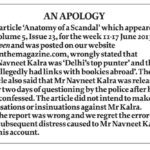“Modi must provide an intellectual alternative”
Aatish Taseer's new novel, The Way Things Were, is an Indian classic spanning the eventful decades between the Emergency and the advent of Modi, set in Lutyens' Delhi. The novelist in conversation with the Editor of Open magazine
 S Prasannarajan
S Prasannarajan
 S Prasannarajan
S Prasannarajan
 |
26 Nov, 2014
|
26 Nov, 2014
/wp-content/uploads/2015/11/Aatish-Taseer-Interview-final.jpg)
Aatish Taseer’s new novel, The Way Things Were, is an Indian classic spanning the eventful decades between the Emergency and the advent of Modi, set in Lutyens’ Delhi. The novelist in conversation with the Editor of Open magazine
An overwhelming sense of being Indian runs through the pages of The Way Things Were.
I had been looking for that sense of Indianness for many years; and I found it in a strange way, through Sanskrit. I can still remember that morning, five or six years ago, when, at the Oriental Institute at Oxford (irony of ironies!) I read aloud my first ever words of Sanskrit: Bṛhad-aśva uvāca. Bṛhadaśva spake. Such a little thing—so commonplace in epic—but it went through me like a chill. I had the feeling of being spoken to over the ages. And the words, though simple, were full of Indo-European resonance, full of a shared history of sound and meaning: aśva, cognate with the Latin equus, is related to such words as equerry and equestrian. And uvāca, the perfect form of the verb vac, to speak, is cognate with the Latin vox and vocare, from where we have words like voice and vocal. So, you see, even this little fragment, when unpacked, conveyed a sense of history. I didn’t know all this at the time, of course; I was simply responding with a child’s excitement to the sound of the language; but I must on some instinctive level have sensed its deeper resonance.
An existential knowledge…..Or is it like being in the world?
Do you mean to ask if this ‘sense of being Indian’ is something abstract and conceptual as opposed to lived and real? I suppose it is more idea than reality. It’s interesting that you ask this question because it goes to the heart of what The Way Things Were is about. Very early on it is said of Toby: ‘there was never a man who knew more about India and, yet, knew India less, than Toby. He was like one of those men who fall in love with the idea of a woman, while all the time insulating themselves from her reality.’ This tension between India, as idea, and India, the reality, is central to the novel. It comes up again and again, as does the question—so shrill in our times—of what it really means to be Indian. Who has the monopoly on authenticity? Who is in possession of a true knowledge of the past?
And Sanskrit in your book, as it is being used by Skanda. builds a semantic bridge between the past and the present, between emotion and knowledge….Right?
Exactly. My agent, Andrew Wylie, described it rather beautifully, in my view, ‘as central metaphor and as a kind of chorus.’ I think that’s right. At one point in the novel Toby and Uma are arguing about why Skanda must learn Sanskrit. And Toby says: ‘It [Sanskrit] will give him the ability to see through language. Not just in India, but across the Indo-European belt. It will give him an instinctive idea of the past. And, in a country like India, where people have so few means to possess such an idea, it will give him a kind of confidence.’
So: on the one hand, there is the confidence of being able to connect past with present, but on the other—and hardly less important!—there is the ability to connect East with West. Speaking personally, I used to feel such a sense of embarrassment about being an English writer in India. But it was something that grew less as I was exposed to Sanskrit. I began to see the history of these languages—the Indo-European languages, at least—as a shared history; I began to see their deep interconnectedness. And since language was my medium after all, it made the past feel less fragmentary; I was less embarrassed by our colonial history, more able to make a whole of things.
This book, shall I say?, is also an argument with an India you are still coming to terms with.
Argument is too strong a word. What the novel does is dramatize a cultural problem. It is a problem I consider to be inimical to intellectualgrowth in India. And that is her inability to reach into the past for cultural and intellectual nourishment, for confidence, for a sense of herself. We live a strange divided reality in India. On the one hand, there is the extraordinary continuation of the past into the present, the likes of which exists hardlyanywhere else. Rites unchanged for twenty-five and thirty centuries; a vastcorpus of ancient literature; hundreds and thousands of people still immersed in the life of Tradition. No need to romanticize this older India; it is inmany ways decayed and cannot on its own meet the needs of the present. But its existence without question represents an extraordinary fact. It should energise modern India, excite in her a curiosity about herself, but it doesn’t. The modern country, which itself is shabby and dwarfish, stands apart. The two Indias do not speak to each other. Both are in need of each other, for growth and renewal, but nowhere is anyone able to open an intellectual stent so that the blood may flow from one India into the other. This, in my view, is a cultural problem. I believe it has prevented India, despite being a democracy, from finding her voice. She remains a country with little to say to the world, with no story about herself that she wishes to project into the future.
A political, cultural, and civilizational argument?
We may have got there in the last question! But let me say that India’s inability to find her voice is not simply a cultural problem; it takes a political shape too. So, we have the Congress on one side—the party of the old establishment—cynical, deracinated, black-hearted. That they had to go is no surprise. But we must ask ourselves what has come in their place? The PM himself, though not a man oflearning, has very good instincts. But what about his cabinet? The idea that a woman like Smriti Irani is in charge of education is enough to make you want to throw yourself from a mobile phone tower. Can she really be expected to understand the enormity of the challenge before her? Does she have any idea of what role the humanities play in free societies, the sense of wonder they are to inspire? Does she understand our historical situation? Does she know what a delicatebusiness it is to steer a country like India away from its colonial past into a future free of cheap revivalism? Can we ask so much of Smriti Irani? Or do we have to accept that an amazing opportunity to profoundly change education in India has once again been lost?
Has you ancestral memory influenced your imagination—and shaped your argument?
I can definitely say that this book came out of a feeling of euphoria at the rediscovery of classical India in my own life. There were moments when that excitement—either at a set of cognates or a verse in the kumārasambhava or at the sheer genius of Mallinatha’s commentary—was like an animating force behind the narrative. It took me back to my book again and again; it filled me with a sense of urgency. The character in the book who embodies this excitement is Toby. Once he glimpses the genius of ancient India, he is never able to look at the modern country he sees around him in the same way again. The contact with the past transforms his relationship to what remains of old India in present-day India. He comes to see his duty as something akin to how a pundit in Benares once explained to me the need to keep teaching the veda in our time: ‘Sometimes when the rains are very heavy, the farmer stores away a pouch of the seed in some high place. Then, once the flood recedes’—nice metaphor for the approach of an enlightened time!— ‘he sows the seed in the field and there is a crop again.’
Mrs Gandhi, Delhi riots, Ayodhya……you get into the perversions, pathologies and passions of modern India. Are you a writer haunted by your political inheritance?
How can I not be! The drama of those years—bookended by the Emergency and the demolition of the Mosque—is real. At home: the Emergency; Mrs. Gandhi’s defeat and return to power; the creation of Bhindranwale; his death in Blue Star; Mrs. Gandhi’s assassination. Abroad: Mullahs in Tehran; Soviet tanks in Kabul; Bhutto’s head in a hangman’s noose. The return of religion, of conservatism. Of Reagan and Thatcher. All this, and we are not even half the way through! It was very near to me, you know: my father was in jail under Zia, my mother was covering these things for the Indian papers. She was coming home with stories about what was happening. This was my direct material.
Is India on your mind a great hurt, a let down, a hope…..?
The truth is that I’m waiting for something specific to happen. It could never have happened so long as the Madonna and Child were in power. They were, in fact, determined that it did not happen. I’m referring to a specific moment in the life of a country when its idea of itself takes shape and it is able—urbi et orbi—to tell a story about itself. It is a moment that certainly happened in Russia in the 19th century; it happened inJapan; I think it might be happening in China. It’s a very delicate moment; it can go easily wrong; the danger of it being lost to authoritarianism or chauvinism is very great. It is something that should have happened in India, but it hasn’t. India seems still just to be muddling through. It is as Maniraja says in the novel: ‘This should be our moment, a moment that comes but once, and we’ve let it pass us by. People think it’s an administrative issue, a question of policy and reform, but it’s not. It is cultural; these things are inseparable from history.’
Delhi of a certain vintage, its class mannerisms and attitudes, comes alive so naturally in your book. Memories of growing up?
It is hard for me to conceal my contempt for the people I grew up amongst. There was an outward veneer of sophistication about them, but it was very thin: they were in fact shallow and stupid people. Many of them went into politics. Some became chief ministers, one a prime minister, others senior ministers. And what did they do with their power? Absolutely nothing. They had seen the world when few could; they had been to the best schools; but none of it had any impact on them. They never tried to understand why some societies worked and others didn’t. They were disgusted by the people who had brought them to power. And they either left them roughly as they had found them or they looted them, squirreling away money for diamonds and flats in Knightsbridge. Nothing makes me happier now than to see that the age of this class of person is over. The drawing rooms of Delhi have been emptied of influence. And it’s a wonderful thing!
No one gets it as real as you do. Reminds me of Rushdie’s Bombay. Is Delhi the city that adds to your imagination—or more? How much it matters as a place in your imagination?
Yes! This must be what Coetzee means when he says: ‘there is no mere landscape.’ Delhi, at some point, became the landscape of my imagination. It can happen. You mention Rushdie and Bombay; I can think of others. Bellow and Chicago, Joyce and Dublin. It takes a certain kind of city at a certain point in its development, doesn’t it? Delhi is definitely at that point. The little world that I grew up in—of privilege and influence—has been completely exploded, encircled, turned inside out. The cities within the city have been stitched together with infrastructure. A new urban whole has come into being. There are subcultures in Delhi; there are immigrants; there is something of an intellectual life. It’s quite a significant moment.
Do the people in your life, or people you know or see, are always in the risk of getting into your pages?
Apparently they live in mortal fear of that. Or, so I’m told. But I don’t think I do it anymore than anyone else. I just get caught more often. No one should take it personally. It’s never out of malice, but out of curiosity and interest. And there is very rarely a direct match; more often than not there are multiple models for a single character. Only rarely does an old aunty gets dragged off her sofa in Lutyens Delhi and thrown—Sikh husband, Marxist parents, great corpulence and all!—headfirst into my novel without a paddle. But these are rare moments of playfulness.
At one level, The Way Things Were is a generational epic, a family story becomes the story of a nation….Isn’t it a “classic” novel that way?
Yes, but it also subverts the traditional novel. There is a second narrative in the present,which acts almost like a framing device. There is quite an interesting variation from the idea of omniscience. How are Skanda and Gauri aware of what is happening in the other narrative, the narrative in the past? Who is telling the story? Skanda is no Nick Carraway and yet he seems to be responding to the unfolding of the story. There is that pressure of the past against the present. This is what I was aiming for. I tried many times to write the story straight—an old fashioned novel set between 1975 and 1992—but I couldn’t. It was only when I found my frame—this thin, very still narrative in the present, under which the past seethes—that I was able to get my material to move.
I find refined classicism throughout the novel, sustained by Skanda’s Sanskritised sensibility. What will you say?
Yes, but Skanda’s interest in Sanskrit, though full of emotion, is at the end of the day a scholarly interest. It is not revivalist; it is not of the Rajiv Malhotra kind. Men like him—Malhotra and his cohorts—have poisoned the pool of classical studies. They’re not scholars; few of them have even a passable knowledge of Sanskrit; but they’re determined to shut down serious scholarship, determined to coerce Western academia into telling them the few banalities they want to hear: things that warm their little NRI hearts: the Aryans did not come from elsewhere but sprang up out of the soil of India; Sanskrit is not one of many Indo-European languages, but the mother of all languages…Now when you start to refashion the past to fit the needs of the present, you must ask yourself why? Why do I want the past to be one way and not another? Because if you set to work blindly remaking the past, you can do it a lot of harm. These monkeys, they want the white man to tell them that India—which Malhotra couldn’t bring himself to live in—was once the greatest country of all. Only then will they go away and let serious people get on with their work. It’s sad to see this kind of sloganeer get traction in India—I read the other day in the paper that Delhi University had embarked upon a project to prove the Aryans were not foreigners. Such foolishness! It makes me fearful for India. And these are naturally fears that my novel is very alive to.
India remains an argument unresolved, but you, as a writer trapped by her, have not abandoned hope?
Probably a lot of writers feel trapped by their place, doomed to certain material. I’m thinking of those frantic letters of Dostoevsky to various family members from Europe. ‘I must absolutely return to Russia—he writes from Florence—‘here I will end by losing any possibility of writing for the lack of my indispensable and habitual material—Russian reality (which feeds my thoughts) and the Russians.’ I feel pretty much the same way about India. It’s a difficult relationship, full of anxiety and frustration, but it feeds me as a writer. The West doesn’t work on me in the same way; I can’t read the faces, I can’t fill in the blanks; nothing suggests itself to me. In India I feel alive as a writer. It’s not about hope, really; it’s my place, that’s all.
Of India, do you wish the way thing were, politically, different?
I’ve always thought of politics as an expression of other things. And, as such, I can see in the politics of India many things that worry me about her more generally. It is, for instance, no surprise to me that the Gandhi family enjoyed the power they did. That, to me, was the political manifestation of a historical condition; I felt it was inseparable from India’s distrust of herself, from her easy servility before the white man. It is for this reason that the Modi election was so important. It was a rare instance of India trusting to herself, throwing up one of her own, one who did not have the blessings of the West at all. And I was pretty dazzled to hear him speak at the U.N. I liked his style and confidence. He seemed so much more urbane and serious than many who had been educated in the West. But I can’t say this is true of the people who surround the prime minister. Modi needs in fact to build an intellectual base of his party from scratch; his people don’t sound good; they sound limited. If he is to succeed, he must provide an intellectual alternative to the power of the English-speaking classes; and, as an extension, the Congress Party. Otherwise, there’ll be a lot of Bharat Mata ki Jai and little else.

/wp-content/uploads/2025/02/Cover_Cricket.jpg)










More Columns
Kohli plays the pitch as India’s middle order delivers Rajeev Deshpande
Unbeaten India in Champions Trophy final Aditya Iyer
Human Bonds Nachiket Joshi